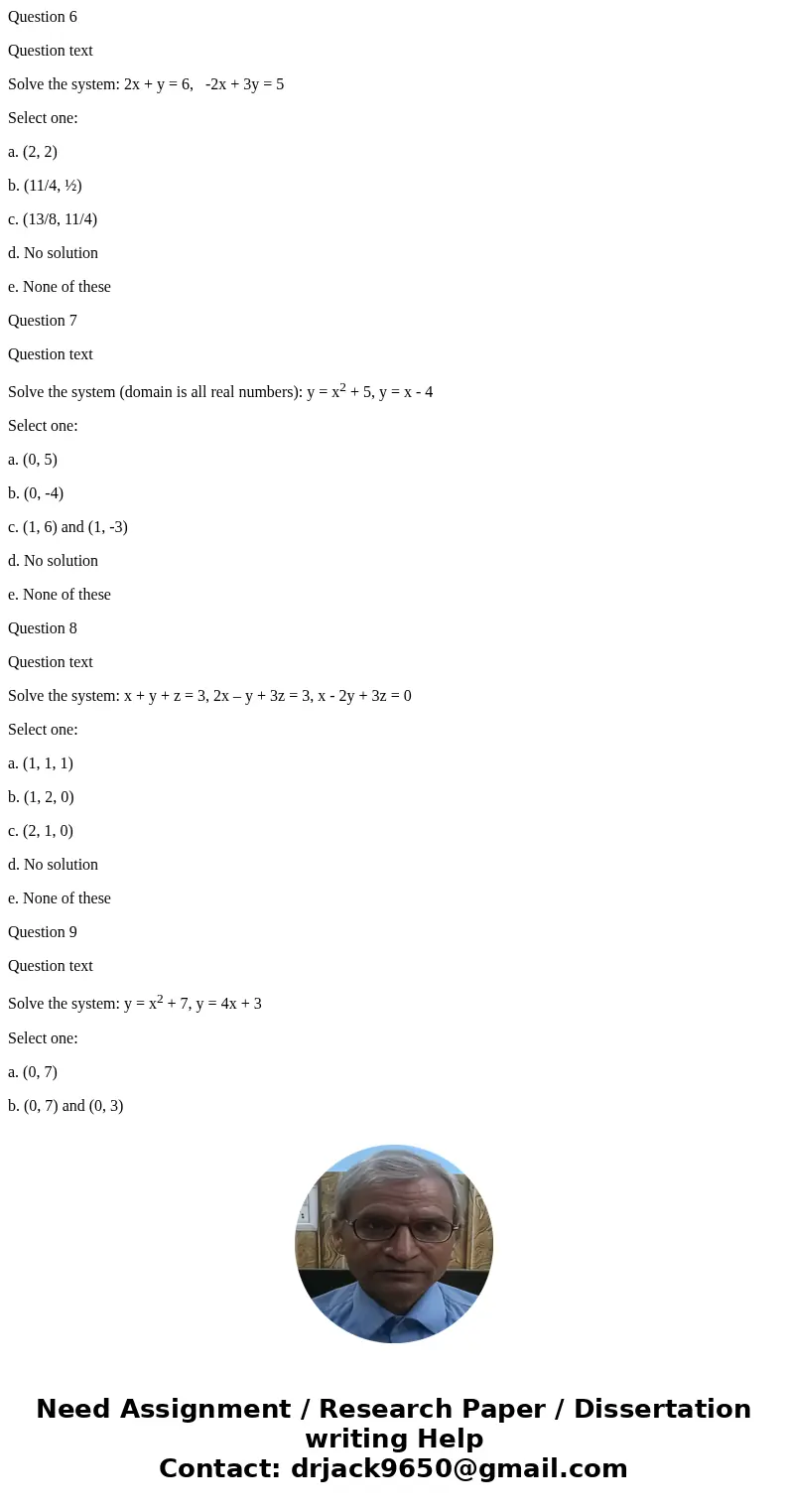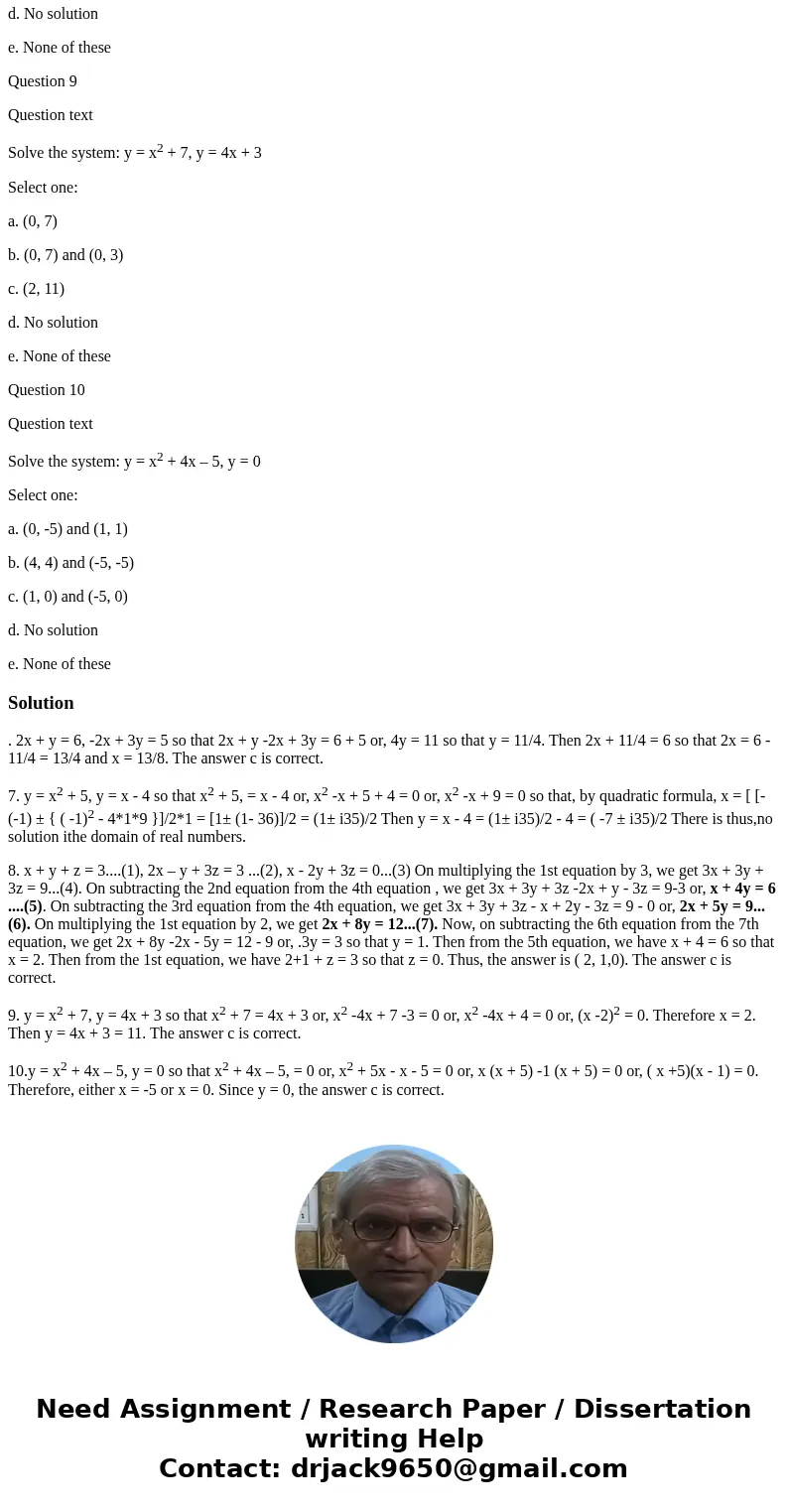Question 6 Question text Solve the system 2x y 6 2x 3y 5
Question 6
Question text
Solve the system: 2x + y = 6, -2x + 3y = 5
Select one:
a. (2, 2)
b. (11/4, ½)
c. (13/8, 11/4)
d. No solution
e. None of these
Question 7
Question text
Solve the system (domain is all real numbers): y = x2 + 5, y = x - 4
Select one:
a. (0, 5)
b. (0, -4)
c. (1, 6) and (1, -3)
d. No solution
e. None of these
Question 8
Question text
Solve the system: x + y + z = 3, 2x – y + 3z = 3, x - 2y + 3z = 0
Select one:
a. (1, 1, 1)
b. (1, 2, 0)
c. (2, 1, 0)
d. No solution
e. None of these
Question 9
Question text
Solve the system: y = x2 + 7, y = 4x + 3
Select one:
a. (0, 7)
b. (0, 7) and (0, 3)
c. (2, 11)
d. No solution
e. None of these
Question 10
Question text
Solve the system: y = x2 + 4x – 5, y = 0
Select one:
a. (0, -5) and (1, 1)
b. (4, 4) and (-5, -5)
c. (1, 0) and (-5, 0)
d. No solution
e. None of these
Solution
. 2x + y = 6, -2x + 3y = 5 so that 2x + y -2x + 3y = 6 + 5 or, 4y = 11 so that y = 11/4. Then 2x + 11/4 = 6 so that 2x = 6 - 11/4 = 13/4 and x = 13/8. The answer c is correct.
7. y = x2 + 5, y = x - 4 so that x2 + 5, = x - 4 or, x2 -x + 5 + 4 = 0 or, x2 -x + 9 = 0 so that, by quadratic formula, x = [ [- (-1) ± { ( -1)2 - 4*1*9 }]/2*1 = [1± (1- 36)]/2 = (1± i35)/2 Then y = x - 4 = (1± i35)/2 - 4 = ( -7 ± i35)/2 There is thus,no solution ithe domain of real numbers.
8. x + y + z = 3....(1), 2x – y + 3z = 3 ...(2), x - 2y + 3z = 0...(3) On multiplying the 1st equation by 3, we get 3x + 3y + 3z = 9...(4). On subtracting the 2nd equation from the 4th equation , we get 3x + 3y + 3z -2x + y - 3z = 9-3 or, x + 4y = 6 ....(5). On subtracting the 3rd equation from the 4th equation, we get 3x + 3y + 3z - x + 2y - 3z = 9 - 0 or, 2x + 5y = 9...(6). On multiplying the 1st equation by 2, we get 2x + 8y = 12...(7). Now, on subtracting the 6th equation from the 7th equation, we get 2x + 8y -2x - 5y = 12 - 9 or, .3y = 3 so that y = 1. Then from the 5th equation, we have x + 4 = 6 so that x = 2. Then from the 1st equation, we have 2+1 + z = 3 so that z = 0. Thus, the answer is ( 2, 1,0). The answer c is correct.
9. y = x2 + 7, y = 4x + 3 so that x2 + 7 = 4x + 3 or, x2 -4x + 7 -3 = 0 or, x2 -4x + 4 = 0 or, (x -2)2 = 0. Therefore x = 2. Then y = 4x + 3 = 11. The answer c is correct.
10.y = x2 + 4x – 5, y = 0 so that x2 + 4x – 5, = 0 or, x2 + 5x - x - 5 = 0 or, x (x + 5) -1 (x + 5) = 0 or, ( x +5)(x - 1) = 0. Therefore, either x = -5 or x = 0. Since y = 0, the answer c is correct.


 Homework Sourse
Homework Sourse